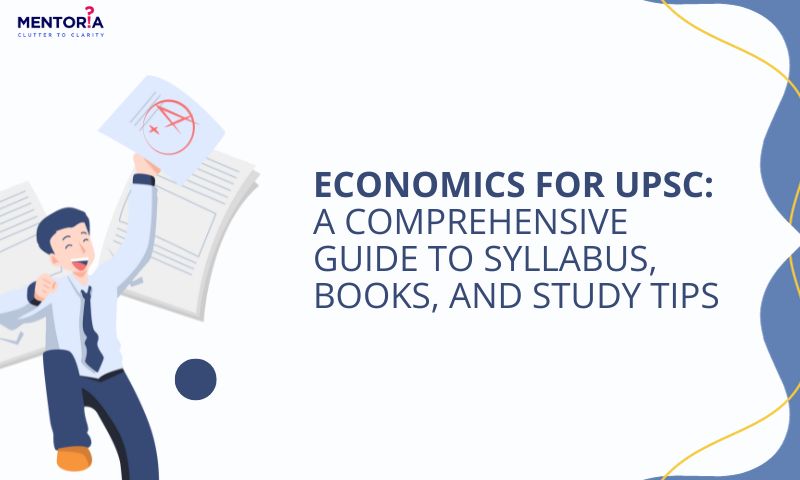Economics For UPSC: A Comprehensive Guide To Syllabus, Books, And Study Tips

Jump to Section
The Economics portion of UPSC requires more than just textbooks and late-night study sessions. It’s a challenge that demands a strategic approach and a touch of finesse. In this guide, we’ll understand Economics for UPSC, from understanding the syllabus to selecting the right books and arming you with study tips that actually work. Whether delving into microeconomic nuances or interpreting global economic trends, we’re here to simplify Economics for UPSC. So, grab your notes and let’s dive into the dynamic landscape of UPSC Economics.
The Expansive Scope Of Economics In UPSC
Economics holds a pivotal role in the UPSC examination, contributing approximately 10-15% to the total marks. It’s not just about grasping economic theories; it’s about understanding the intricate interplay of economic principles that shape nations. A solid understanding of microeconomics, constituting 60-70% of Economics questions, can significantly impact your overall score. Recognising the scope of the subject is key to strategic preparation, ensuring that you allocate your study efforts wisely across micro and macroeconomic concepts. Economics isn’t just a subject; it’s a dynamic force that influences policy making and societal well-being. Embrace the scope, and you’ll find yourself navigating the UPSC Economics section with confidence.
- Economics encompasses a diverse range of topics such as economic development, poverty, inflation, and globalisation, providing a holistic view of a nation’s economic health.
- Approximately 10-15% of the total marks in UPSC are allocated to Economics, underscoring its significance in the overall examination.
- Your proficiency in Economics directly influences your score in the General Studies Paper III of the UPSC Mains.
- The subject bridges theoretical and practical aspects, requiring candidates to apply economic principles to real-world scenarios.
Navigating The UPSC Economics Syllabus
The UPSC Economics syllabus is not a maze but rather your roadmap to success in the examination. It encompasses a comprehensive range of topics, from micro to macroeconomics, requiring a strategic breakdown for effective preparation. Notably, approximately 60-70% of Economics questions in UPSC are derived from microeconomics alone. Understanding this breakdown enables you to tailor your study plan, emphasising areas with higher weightage. Your journey through the syllabus is a quest for mastery, where every concept mastered brings you closer to triumph in the UPSC examination. With a clear understanding of the syllabus, you can strategically navigate the expansive landscape of Economics, positioning yourself for success.
- Microeconomics, macroeconomics, and Indian economy are key pillars, each contributing differently to the overall weightage.
- Economic and social development, sustainable development, and inclusive growth are integral components that shape the syllabus.
- Candidates must delve into global economics, understanding international trade, organisations, and economic agreements.
- Environmental impact assessment, disaster management, and the role of NGOs add a contemporary touch to the syllabus.
- Familiarising yourself with the syllabus breakdown helps in allocating time and focus effectively during the preparation.
Essential Books For UPSC Economics
Books are not just study materials; they are your strategic allies in mastering UPSC Economics. These books offer in-depth insights, providing a holistic understanding of economic principles and their real-world applications. Your choice of books is not merely about information absorption; it’s about equipping yourself with the tools necessary to tackle the diverse range of questions that UPSC poses. Consider these books your trusted companions in the journey to command a nuanced understanding of Economics for your UPSC examination.
- Begin with NCERT textbooks to build a robust foundation
- “Indian Economy” by Ramesh Singh
- “Macroeconomics” by Dornbusch and Fischer.
- Refer to international economics books like “International Economics” by Paul Krugman for a global perspective.
- Newspapers like ‘The Hindu‘ and ‘The Indian Express‘ are valuable supplements for staying updated on economic issues.
- Regularly read economic surveys of different countries to broaden your understanding of global economic trends.
- Online resources like Investopedia and World Bank publications provide supplementary insights into evolving economic concepts.
Deciphering Economic Survey And Budget
Unlocking the secrets within the Economic Survey and Union Budget for UPSC is not just a task; it’s a crucial strategy for mastering UPSC Economics. These real-world economic documents serve as treasure troves, shaping a significant portion of UPSC Economics questions. Several questions are inspired by the insights offered in these reports. Immersing yourself in the analysis of economic policies, fiscal decisions, and broader economic perspectives within these documents provides you with a unique advantage. It’s not just about reading; it’s about decoding the economic narratives that unfold within these reports, equipping you with the depth of understanding required for success in UPSC Economics.
- Analyse the Economic Survey’s statistical data, as it often forms the basis for both objective and subjective questions.
- Understand the Union Budget’s allocation of funds to different sectors, which can be a potential source for questions.
- Comprehend the economic policies and initiatives proposed in the Budget, linking them to broader economic concepts.
- Regularly follow economic analyses by experts to gain diverse perspectives on the implications of budgetary decisions.
- Participate in online forums and discussions to enhance your critical thinking and analysis skills related to economic policies.
Mastering Case Studies And Application
In the realm of UPSC Economics, theory alone won’t suffice; application is key. Case studies play a pivotal role, constituting around 20-30% of the questions. Diving into real-world scenarios, analysing economic policies, and envisioning solutions are not just study methods; they are exercises in becoming an economic strategist. These case studies bridge the gap between theory and practical understanding, challenging you to apply economic concepts to complex, real-life situations. It’s not just about studying cases; it’s about preparing yourself to think critically and strategically, skills that set you apart in the UPSC examination and, more importantly, in real-world economic scenarios.
- Practise solving case studies from previous years, focusing on understanding the economic principles at play.
- Apply theoretical knowledge to real-world scenarios, addressing the socio-economic implications of proposed solutions.
- Evaluate the success and failure of economic policies in historical contexts to enrich your analytical toolkit.
- Engage in group discussions on economic issues, fostering the ability to articulate your thoughts and solutions effectively.
- Use contemporary case studies, like the impact of the COVID-19 pandemic on global economies, to stay attuned to current economic challenges.
Effective Study Tips For Economics
Studying Economics for UPSC is a gradual process. Breaking down study sessions, focusing on understanding concepts rather than rote learning, and integrating current affairs into your routine are not mere tips; they are the pillars of a successful study strategy. Did you know? Approximately 40% of Economics questions are inspired by current events. Staying updated isn’t just a recommendation; it’s your secret weapon. These study tips aren’t just guidelines; they are the keys to unlocking a deeper, more comprehensive understanding of Economics for your UPSC examination.
- Regularly revise economic concepts to reinforce your understanding and prevent information overload.
- Solve previous years’ question papers to familiarise yourself with the exam pattern and identify recurring themes.
- Create a study schedule that allocates specific time slots for microeconomics, macroeconomics, and current affairs.
- Engage in peer discussions to gain diverse perspectives and strengthen your ability to communicate economic ideas.
- Follow economic experts and institutions on social media platforms for real-time updates on economic developments.
The Art Of Answer Writing In UPSC Economics
Answer writing in UPSC Economics is not a mundane task; it involves presenting a compelling argument concisely. Structuring your answers logically, incorporating diagrams to illustrate points, and prioritising quality over quantity are not just writing techniques; they are strategies that set your answers apart. In UPSC, where clarity and articulation matter, these skills become your tools for effective communication. It’s not just about what you write; it’s about how you write it. The art of answer writing goes beyond memorisation; it involves crafting responses that reflect a profound understanding of economic concepts, showcasing your analytical abilities in the best possible light.
- Develop a clear and concise writing style, ensuring that each sentence contributes directly to the overall argument.
- Use diagrams judiciously to illustrate economic concepts, making your answers visually appealing and easy to comprehend.
- Practice time management during mock exams, refining your ability to articulate well-structured answers within the allotted time frame.
- Cultivate the habit of self-evaluation, critically reviewing your answers to identify areas for improvement.
- Seek feedback from mentors or fellow aspirants to gain insights into different approaches to answering economic questions.
Crack UPSC Economics With Mentoria’s Help
As you study Economics for UPSC, remember it requires meticulous planning and strategic execution. Each percentage, each statistic, and each concept holds weight in shaping your success. With the right books, study tips, and a strategic mindset, you’re not just preparing for an exam; you’re preparing to comprehend the economic pulse of the nation. Dive into the numbers, absorb the concepts, and emerge not as a UPSC candidate but as a master economist in the making.
We’re here to provide you with all the help! Kick-start your journey with Mentoria and discover the right fit for you. Feel free to call us to speak to our career mentors and choose the right guidance plan that suits your needs. Mentoria’s career guidance programme enables you to choose your perfect fit from 3 streams, 850+ courses, and 12,000+ careers, and discover what will bring out the best in you.









